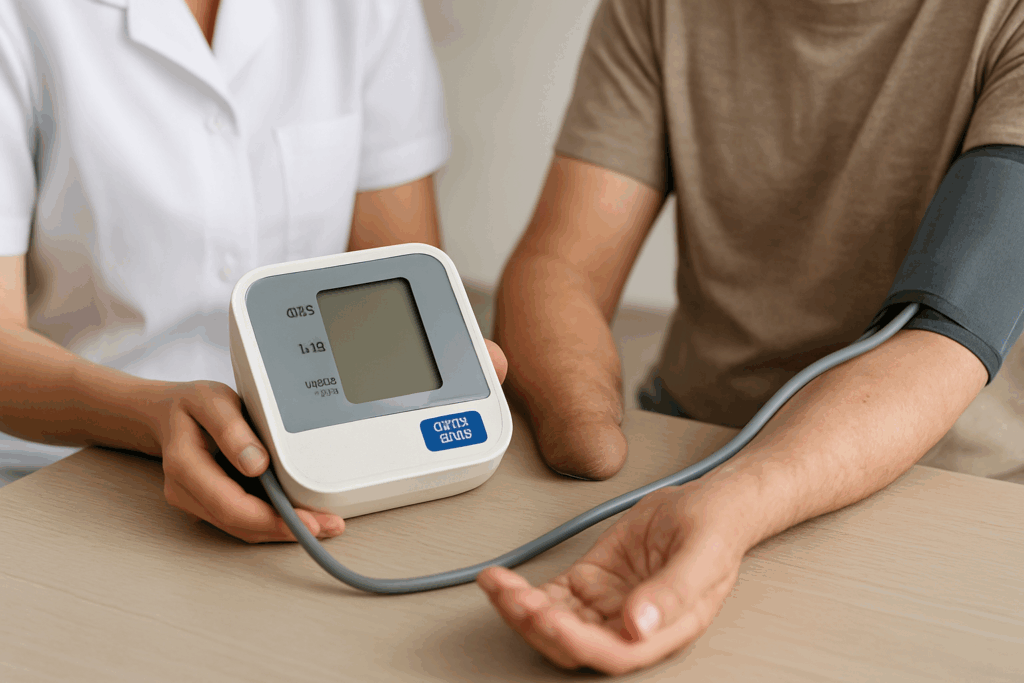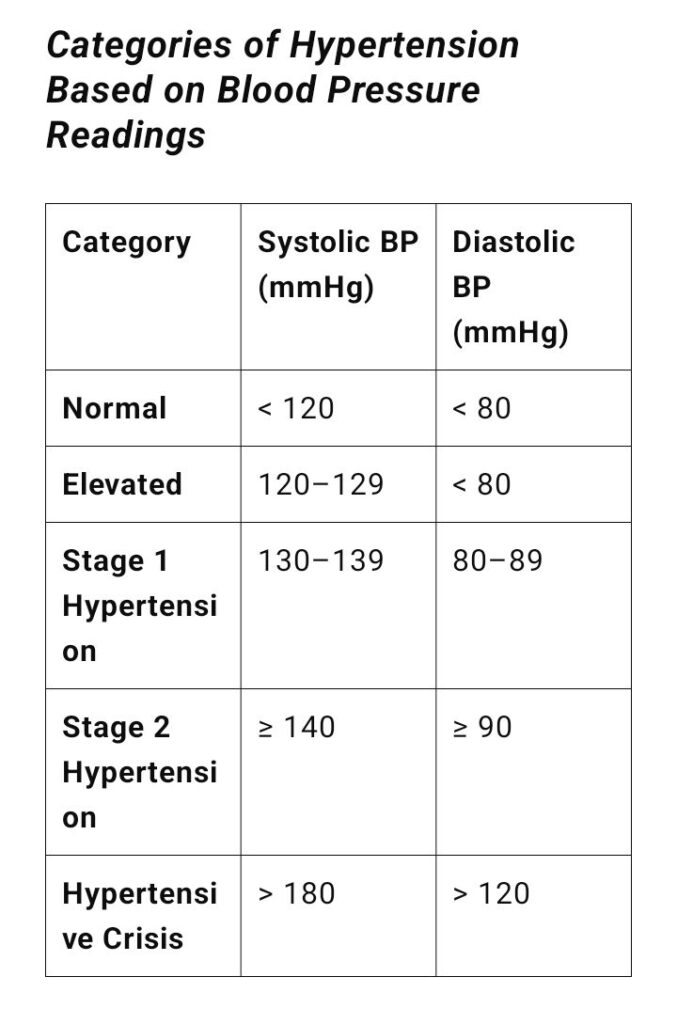
1. Introduction to High Blood Pressure
What is High Blood Pressure (Hypertension)?
High blood pressure, also known as hypertension, is a condition in which the force of blood against the artery walls is consistently too high. The heart has to work harder to pump blood through the body, which can damage blood vessels over time. Hypertension is often undiagnosed because it does not present obvious symptoms. However, uncontrolled high blood pressure significantly increases the risk of heart disease, stroke, kidney failure, and other life-threatening complications.
Blood Pressure Readings: What Do They Mean?
Blood pressure is measured in millimeters of mercury (mmHg) and is represented as two numbers:
Systolic pressure (the top number): The pressure in the arteries when the heart beats.
Diastolic pressure (the bottom number): The pressure in the arteries when the heart is resting between beats.
Normal blood pressure is generally considered to be less than 120/80 mmHg. Readings higher than this indicate varying degrees of hypertension, which require medical intervention.
Global Prevalence of Hypertension
Globally, high blood pressure affects nearly 1.2 billion people, with approximately 47% of adults in the U.S. diagnosed with hypertension. The prevalence of high blood pressure increases with age, but it can also occur in younger individuals, especially in those with unhealthy lifestyles. Many people with hypertension are unaware of their condition, which is why routine monitoring is crucial.
—
2. Symptoms and Causes of Hypertension
Recognizing the Symptoms of High Blood Pressure
Hypertension is often asymptomatic, meaning that individuals with high blood pressure may not feel any different, even as the condition damages the heart and arteries. However, when hypertension reaches dangerous levels (e.g., 180/120 mmHg), symptoms may include:
Severe headaches
Shortness of breath
Nosebleeds
Chest pain
Vision changes
Primary vs. Secondary Hypertension
Primary Hypertension: This is the most common type of high blood pressure and develops gradually over many years. The exact cause is unknown but is believed to be linked to genetic factors, aging, and lifestyle habits.
Secondary Hypertension: This type of hypertension is caused by an underlying medical condition, such as kidney disease, hormone imbalances, or the use of certain medications.
Causes and Risk Factors for Hypertension
Risk factors for developing high blood pressure include:
Genetic factors: A family history of hypertension increases your risk.
Lifestyle factors: Poor diet, lack of physical activity, smoking, and excessive alcohol consumption can all contribute to hypertension.
Age: The risk of developing high blood pressure increases with age, especially after 45 for men and 65 for women.
Obesity: Excess weight increases the risk of developing hypertension due to higher blood volume and increased strain on the heart.
—
3. Diagnosis and Tests for Hypertension
How Hypertension is Diagnosed
Diagnosing hypertension requires several blood pressure measurements over time. A doctor will typically use a blood pressure cuff to take readings during a routine checkup. To confirm hypertension, a series of readings must be consistently elevated over multiple visits.
The Role of Regular Blood Pressure Checks
Given that high blood pressure often presents no symptoms, it is essential to have regular blood pressure checks, especially for individuals with known risk factors. Early detection of hypertension allows for prompt treatment and lifestyle modifications that can prevent severe complications.

—
4. Managing and Treating High Blood Pressure
Lifestyle Changes to Control Hypertension
Effective management of hypertension typically begins with lifestyle changes. These may include:
Healthy eating: Following a balanced diet like the DASH (Dietary Approaches to Stop Hypertension) diet, which is rich in fruits, vegetables, lean proteins, and low-fat dairy.
Exercise: Regular physical activity, such as walking, jogging, or swimming, can lower blood pressure and improve overall heart health.
Weight management: Maintaining a healthy weight reduces the strain on your heart and helps control high blood pressure.
Stress management: Practicing relaxation techniques such as deep breathing, yoga, or meditation can help lower hypertension levels.
Medications to Lower High Blood Pressure
In many cases, lifestyle changes alone are not enough to control high blood pressure, and medications are prescribed. Common drugs for hypertension include:
Diuretics (water pills)
ACE inhibitors
Calcium channel blockers
Beta-blockers
These medications help lower blood pressure by relaxing blood vessels, reducing heart rate, or removing excess sodium from the body.
To access resources on blood pressure management click here.
Monitoring Hypertension Long-Term
Once diagnosed with hypertension, continuous monitoring is essential to assess the effectiveness of treatment and make adjustments as needed. Many people with hypertension are advised to track their blood pressure at home using an automated monitor.
To access resources on blood pressure management click here.
—
5. Prevention of High Blood Pressure
Effective Preventive Measures for Hypertension
Preventing hypertension is possible with lifestyle changes:
Healthy diet: Reducing salt intake, consuming more fruits and vegetables, and limiting processed foods can prevent high blood pressure.
Regular physical activity: Exercising most days of the week helps reduce hypertension and strengthen the heart.
Limiting alcohol consumption and quitting smoking are also critical steps in preventing high blood pressure.
—
6. Long-Term Outlook and Complications of Hypertension
The Dangers of Uncontrolled High Blood Pressure
If left unmanaged, high blood pressure can lead to serious complications, including:
Heart disease
Stroke
Kidney failure
Vision loss
Cognitive decline
Managing Hypertension and Preventing Complications
With early detection and appropriate management, most people with hypertension can live long, healthy lives. Adhering to treatment plans and regularly monitoring blood pressure is essential to prevent the severe effects of high blood pressure.
—
7. Frequently Asked Questions about Hypertension
Understanding Blood Pressure Categories
What does it mean if your blood pressure is classified as “Stage 1 Hypertension”? This means that while your blood pressure is higher than normal, it can often be managed through lifestyle changes or medication.
Can Hypertension Be Cured?
Hypertension is generally a lifelong condition. However, with consistent management through medications, diet, exercise, and other lifestyle adjustments, high blood pressure can be controlled and its complications prevented.
Best Practices for Home Blood Pressure Monitoring
Using a validated blood pressure cuff and taking readings at the same time every day can help monitor hypertension effectively at home. Always follow your doctor’s advice on managing high blood pressure.
—